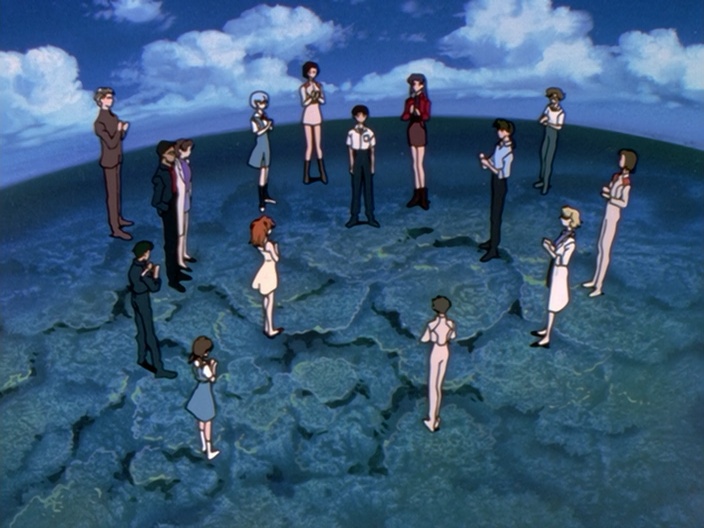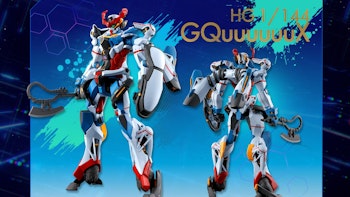
When episode 26 of Neon Genesis Evangelion, ‘The Beast that Shouted “I” at the Heart of the World,’ originally aired on 27 March 1996, opinion was divided. Alongside the production issues that plagued the final episodes, certain sections of the fanbase regarded it as a cop-out ending and a disappointing conclusion to an otherwise fantastic series. Of course, some even took it upon themselves to teach Studio GAINAX a lesson, defacing the studio with graffiti and sending death threats to the staff and the director, Hideaki Anno.
Little did they know, however, that this was the best that they were ever going to get.
In 1997, several months after the finale of the TV anime, Evangelion came to movie theaters under the title Death and Rebirth. This new theatrical feature was essentially a recap movie, presenting the series’ events out of chronological order and instead organized by different themes and characters, but also included a new version of episode 25. This was originally intended to be the entire film, but was not completed on time. Nevertheless, it would not go to waste.
On 19 July 1997, The End of Evangelion hit theaters. This used the alternative version of episode 25 put together for Rebirth but also made some changes, alongside adding another episode. Far from being just another installment, however, it would go on to change the series forever, acting as the ‘proper’ conclusion in many fans’ eyes and earning widespread critical acclaim.
In many ways, The End of Evangelion has come to symbolize what people want to love about Evangelion: inventive imagery, complex characters, and relentless misery. Yet, there is a reason why Hideaki Anno ultimately chose something very different for the ending of the original Neon Genesis Evangelion TV anime: it fits with the themes of the story much better, alongside putting all subsequent reiterations to shame.
What is the point of Evangelion?

What is the point of Evangelion? That is a question that countless scholars, journalists, and fan communities alike have pondered ever since the series first began back in 1995.
The common misconception is that there is none... or at least, no deeper meaning was initially intended by its creators. An apocryphal quote often attributed to Anno often goes something along the lines of ‘There is no meaning, you’re just reading far too into it,’ but this quickly smacks head on into reality once you spend just a couple of minutes perusing the ‘Statements by Evangelion Staff’ section on the Evageeks wiki or Gwern’s massive ‘Source Anthology,’ organized by reliability and year.
Probably the most important primary source for understanding the original Neon Genesis Evangelion series is Hideaki Anno’s short article ‘What were we trying to make here?,’ apparently written before the TV series started on 17 July 1995. Anno says that he ‘started this production with the wish that once the production complete [sic], the world, and the heroes would change’ and that his ‘only thought’ was to ‘burn [his] feelings into film.’ Evangelion was therefore always profoundly influenced and shaped by Anno’s own experiences, including his mental state.
It is well known that Anno has always struggled with depression, and most seriously of all during the production of Neon Genesis Evangelion. In a set of liner notes attached to the ‘Ghibli ga Ippai’ 1996 Studio Ghibli DVD box set, Anno describes how he was ‘in a state of mental collapse’ once the series had ended and was only ‘moved deep within [his] heart’ by an ‘encouraging phone call’ from someone left unnamed, but most likely Hayao Miyazaki. Hiroyuki Yamaga downplayed Anno’s depression in a 1998 interview in the Evangelion magazine, but you'd be hard pressed to deny its all-pervasiveness in all aspects of the series..
Through the characters of Neon Genesis Evangelion, Anno appears to be searching for a way to cure his own ills. This might be the ‘change’ he alludes to in ‘What were we trying to make here?’. Furthermore, during an Otakon panel, assistant director Kazuya Tsurumaki very clearly said that ‘Shinji was modeled on director Hideaki Anno… He thought that working on Eva could help him to change.’ With this in mind, we can see Shinji’s journey as an allegory for Anno’s, or at least what he would ideally want it to be.
Relying on others for your own personal happiness

What is Shinji’s, and therefore Hideaki Anno’s, big problem throughout the whole of Neon Genesis Evangelion? Relying on others for his own personal happiness. Part of this is informed by childhood trauma, being abandoned by his father after the death of his mother, but is also a fatal character flaw that crops up again and again throughout the series, eventually laying the basis for its conclusion.
At the beginning of the series, Shinji makes peace with his hardships piloting Unit-01 when he realizes that it makes other people happy, or at least not suffer. During a particularly low point in episode 4, he admits that he doesn’t enjoy piloting the robot but alludes to doing it for others before Misato cuts him off. In episode 26, he says, ‘When I pilot the Eva, they praise me! People praised me!’ while the text on the screen reads ‘That makes me happy.’ Although at first there appears to be a big difference between him and Asuka (she pilots the Eva ‘for herself’ while he does it ‘for others’) it is explained that even Shinji’s reliance on others is ultimately for his own benefit.
As the series goes on, Shinji gets better and better at operating Unit-01, to the point where he even surpasses the previous wünderkid, Asuka. This puts him in a precarious position going into the Tohji Suzumura/Fourth Children two-parter where this newfound confidence is tested, also underscored by his near-death experience in episode 20. By the time Shinji emerges into the back end of the series, his spirit and ego are thoroughly broken.
Admittedly, the way in which the Third Impact and the Human Instrumentality Project are triggered in the original Neon Genesis Evangelion TV anime is quite vague. Only End of Evangelion shows how this actually happens, while episode 25 of the original series suddenly cuts to it after the death of Kaworu. Still, this doesn’t rob it of its meaning, nor does it preclude the fact that is the most thematically apt conclusion for the series.
Congratulations: learning to love yourself before others

The final congratulations scene in Neon Genesis Evangelion episode 26 has, perhaps rightfully so, been parodied and memed to high heaven. It's a bit silly, after all, with everyone saying the same corny line and clapping for seemingly no reason; yet, through all the sneering cynicism and popular pessimism, it remains one of the most ambitious and thought-provoking conclusions to any anime series.
In episode 25, it is Shinji’s wish that begins the process of Instrumentality and melds humanity into one consciousness. He asks, ‘I wished for this?’, to which Rei replies, ‘That’s right. For destruction. A world where no one is saved.’ Burdened by his own trauma and abused by the people around him, he wished for a world of ‘Destruction. Death. A return to nothingness,’ to use Asuka’s phrase. But why? Because the old world was one where ‘nobody saved me! That’s all.’
Relying on others for his own personal happiness, therefore, ultimately backfired when he expected other people to fill the hole in his heart for him.
In episode 26, he learns that ‘People who hate themselves can never be capable of loving or trusting others’ (Rei) and that even if he doesn’t like the person he is now, he can perhaps ‘learn to like [himself] one day.’ After all, the way in which we see the world is just a ‘myopic worldview [built] using information altered to protect yourself’ (Kensuke) and that doesn’t remain the same forever. What Anno appears to be saying is that, even if we can’t love and trust in others right now, we might be able to do so in the future: it’s a process that takes time.
Ending vs. Ending: Neon Genesis Evangelion and The End of Evangelion

To a certain extent, The End of Evangelion doesn’t deny this point of view. When Shinji rejects Instrumentality and chooses to return to human form from the pool of LCL, he admits that ‘I still have no idea where happiness can be found,’ but says that ‘I’ll stay here and keep thinking about my life.’
Nevertheless, The End of Evangelion undoubtedly leaves off on a much darker note. While the ultimate thematic conclusion of Neon Genesis Evangelion is prefaced by a goofy alternate reality scene where the characters are reimagined as the cast of a stereotypical slice of life anime, Shinji’s final words to his mother in End are ‘I know that [it] will just lead me to the same obvious conclusions over and over’, while the final scene of the film (Shinji attempting to choke Asuka as they are left alone in the post-Third Impact world) seems to suggest that there is actually no hope. This is a far cry from the more uplifting, raucous tone of Neon Genesis Evangelion.
The argument has been made many times that Neon Genesis Evangelion and The End of Evangelion aren’t mutually exclusive, and that End represents the ‘outer’ form of the Third Impact while the TV series portrays the ‘inner,’ yet there are several problems with this. First, even if the two endings do not contradict each in terms of story or canon, their tones are completely different: one pessimistic and one hopeful. The fact that the movie also reuses the episode 25/26 format, replacing the titles with ‘Air’ and ‘I need you’, seems to suggest that they are indeed replacements for one another.
Even if none of the production staff have ever said that The End of Evangelion was intended to replace Neon Genesis Evangelion, it’s telling that certain sections of the fanbase embrace End over the original. Some even say that you should skip straight to it after episode 24. As stated at the beginning, this is probably because it represents what people want to love most about Evangelion: inventiveness, complexity, and melancholy. Yet, it is often forgotten that it was originally intended to be much more uplifting, alongside addressing directly many viewers’ own struggle and insecurities.
Evangelion's final ending? Hideaki Anno and the creator he is today

One can’t comment on the drastic change in tone between the original TV series and The End of Evangelion without acknowledging the changing circumstances of its creator, Hideaki Anno.
As mentioned, he was extremely depressed after the series ended: he had poured his heart and soul into this work, yet was rejected at the very end by a sizable portion of his own fan community. That can’t have been easy.
Stemming from this, End of Evangelion can be seen as a response to the popular criticism, and there are even several instances in the film where he appears to addressing the audience directly: the live-action segment sees footage from an actual screening of Death and Rebirth conducted at the now-closed Milanoza theater in Shinjuku followed by the narration ‘Then where are my dreams? [Shinji] Beyond where reality lies. [Rei]’
When combined with Rei’s previous statement, ‘That’s not a dream. That’s just a substitute for reality,’ it appears as if Anno is both criticizing the obsessive escapism of his audience and their pointed response to the ending of his original work, which he ‘burned his feelings into.’ Nevertheless, he still bent to their whims and made something that they ultimately preferred.
Hideaki Anno is a very different person today. He’s happily married, manages his own company, and works with the properties he’s always loved. Part of the reason I wrote this article was because Evangelion 3.0+1.0, the final ‘Rebuild’ film, was supposed to be released at the end of this month, but that changed part way through the drafting process. Nevertheless, all eyes are on Anno to see what kind of ending he puts together for this final, final Evangelion film.
Considering the change in circumstances (and Evangelion’s close relation to Anno’s own mental state) it seems unlikely that we’ll get another End of Evangelion. But it remains to be seen what kind of final note the celebrated creator leaves off on in a work that professes to say ‘Bye bye, all of Evangelion.’
I hope that it’s something a little more hopeful.
You can watch Neon Genesis Evangelion and The End of Evangelion via Netflix.
This piece was originally published to OTAQUEST on January 29, 2021










